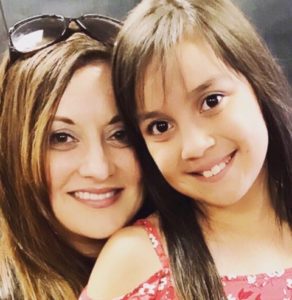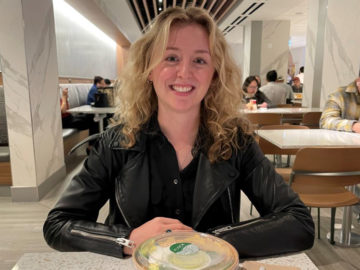Aftermath
After Tragedy, Mom’s Warning About the Dentist
Her daughter Denise died from exposure to a toothpaste that contained dairy. Now this mom shares important precautions at the dentist office.

If you’re like most people living with food allergies, you started out feeling like you were alone on this journey. It is incredible how unfamiliar the world is with anaphylaxis, given the rising number of people affected by it. My goal in life now is to raise awareness – in my 11-year-old child’s memory.
It’s a sad, inescapable truth that my daughter, Denise Saldate, suffered a fatal anaphylactic reaction to dairy, related to our April 4, 2019 trip to the dentist’s office. Denise’s passing is the absolute worst-case scenario. But my intent in this article is to provide tools for food allergy families in an effort to prevent any further tragedies.
In sharing our story, I would like to inspire hope that you can live healthy, fulfilled lives despite having food allergies. But to do that, there are important precautions to take.
My journey as an allergy mom started 12 years ago. From the moment Denise was born she required hypoallergenic formula. She could not hold down any liquids that were milk- or soy-based. Her father and I didn’t think much of it at the time. After all, our three older daughters had required soy as newborns because they could not tolerate milk-based formulas either.
But this would turn out to be no minor intolerance. As a 1-year-old, Denise was diagnosed with a severe milk allergy, and the allergist also confirmed she was allergic to soy, wheat, egg white, peanuts and shrimp. I learned from the allergist how important it was to read all labels thoroughly in order to avoid all the allergens, especially dairy.
It was a lesson that would come back to haunt me. A lesson I pray no other parent ever has to learn the hard way.
Label Reading Becomes Habit

Throughout this food allergy journey I was just a mom, learning as I went. I often felt alone and anxious, desperately searching for ways to keep my baby safe, while somehow adding flavor and fun to her meals. And to her life.
As most allergy moms can attest, we feverishly research and happily rejoice whenever we find a new food to safely introduce to our babies. We read label after label, and once our kids are old enough, we teach them to do the same. Denise was well aware of her allergies, some of which she outgrew, and very good about reading every food label.
Up until she was 2 years old, my daughter had a moderate case of eczema that would flare up any time she used a standard product such as a body wash or lotion. During that time, we had to buy hypoallergenic products to control the flare-ups. So our family became accustomed to reading labels on non-food items as well.
We referred to these things as her “special” products, such as her “special soap,” to help her embrace her difference. After about 2 years, the eczema subsided and worrying about non-food items thankfully became an issue of the past. Or so we thought.
As some of you have heard, the product that ended my beautiful Denise’s life was toothpaste. That’s right, toothpaste. It still blows my mind to think that something that we all use daily for healthy smiles contained an ingredient that took my baby’s life.
An Allergy Mom’s Warning

Denise was nicknamed Neesie Bear and her smile always brightened my days. On April 4, 2019, I took her to the dentist. During the visit, the dentist recommended a product to help strengthen her tooth enamel.
In 11 years of researching and label reading to keep Denise safe, toothpaste had never once come up on our radar as a product that contained milk. As a result, neither she nor I thought to check the ingredients of her “special” toothpaste, on what became the worst day of our lives.
I want to warn you of what I wish – a million times over – we’d known. If you, or someone you love, has a life-threatening allergy to milk and dairy products, add these two words to your vocabulary and list of ingredients to avoid: Recaldent, a tooth enamel strengthener, and casein, one of the main milk allergy proteins. Recognize that these are likely to be in non-food products, and understand that such products can be just as much a threat as food items.
We lost our Neesie Bear because she used this “special” toothpaste that evening. I’ve been told that, since the paste was all over her gums, it would have entered her bloodstream rapidly through the mucus membranes of her mouth. The resulting reaction was so swift in fact, that within just minutes of brushing her teeth, Denise was suffering severe anaphylaxis. I administered her EpiPen and asthma inhaler. Then, for the first time ever, I used my first-aid training to perform CPR on my own youngest daughter, while Denise’s sister spoke with the 911 dispatcher.
I say this, not to scare you, but to prove why it is so extremely important to carry your prescribed life-saving medications on your person at all times. Time is not always a luxury you have with anaphylaxis; minutes, even seconds count. It’s a message my Denise would want you to know.
Dental Office Allergy Tips
I also want to share some advice. Following are important tips to help you and your loved ones with allergies to stay and feel safe while visiting the dentist.
1. Bring your life-saving medication – With a food allergy, it’s essential that you carry at least 2 epinephrine auto-injectors. Always have these with you at a dental appointment in case of an allergic reaction, along with any other medication your allergist advises you to carry. If you have asthma, have your inhaler, too.
2. Communicate well with your dental care team – Preparation and communication about your allergies with your dental care team are key to ensuring your safety at a dental office. It is important that all members of your team are aware of your allergens. This includes: the dentist, dental assistant, X-ray technician, and staff at the front desk who check you in and out. They may offer you products recommended by the dentist.
Do not hesitate to repeat yourself, to ask questions, or to double- or even triple-check that your team is prepared to care for you appropriately. The AAAAI allergists’ organization says the most likely allergens to be concerned about at the dentist are dairy, latex and gelatin. But other allergens can turn up, so communicate rather than assume. Be sure that staff members are all aware of every one of your allergens, even those that may seem insignificant to a dental visit. Do this EVERY visit, EVERY time.
3. Complete and update the medical questionnaire – When filling out your medical questionnaire, note every one of your allergens. If you aren’t sure whether something should be listed, mention it anyway. If you don’t see a space for it, find a space to write it in. As allergies may change as you get older – you may out-grow some while others may become new risks – it is vital to update your questionnaire frequently.
Dentists recommend that you update your questionnaire at each new six-month check-up. And while you’re communicating, it’s a good idea to ask your dentist: “Did you see my medical form? I’ve updated it.”
4. Read package labels thoroughly – If your dental office recommends or prescribes a product or medication, be sure to read each label thoroughly! In addition to the ingredients, take time to review each container and read every word, front to back. If an ingredient is unfamiliar to you, or you are not sure about something written on the label, ask!
Lastly, do not be afraid, but be empowered to speak up and advocate for yourself and your loved ones.
Monique Altamirano and her family live in Los Angeles County. Monique shares “Neesie Bear’s Allergy Safety Tips and More” at Neesibear.com. On Facebook and Instagram, search NeesieBear.
Related:
After Daughter’s Fatal Reaction to Toothpaste, Mother Calls for Caution
Australian Girl’s Reaction Raises Issue of Allergy Risks at Dentist’s Office
Mom Warns Miscommunication Led to Tween’s Allergic Reaction at Dentist


